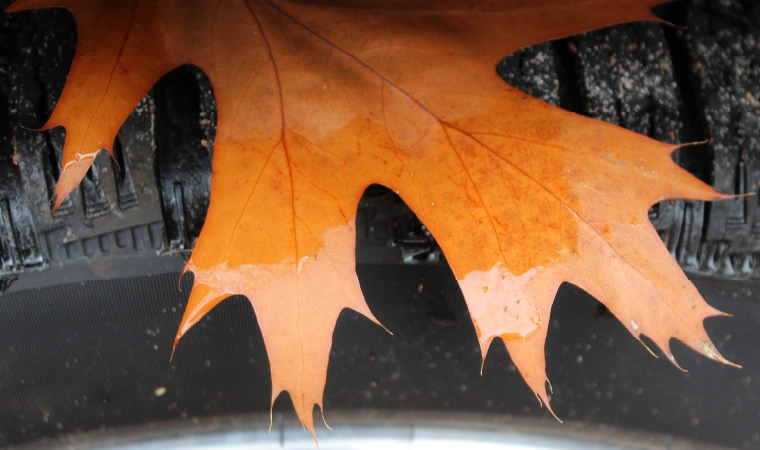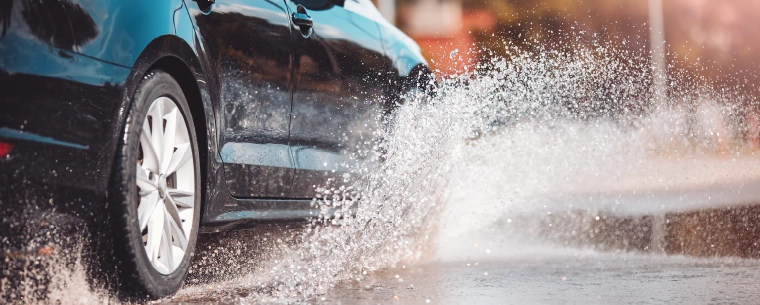How Wet Weather Can Affect Your Car's Brakes
Published on: Monday, 05 August 2024 | Author: Jack Dreyer
If you live in the UK, you’ll know that wet weather is a common occurrence regardless of the time of year. Rainy conditions, regardless of the temperature can wreak havoc on our car’s brake pads and braking system.
As drivers, it’s important to understand how adverse weather conditions can affect our brakes and what we can do to minimise the impact. If you’re ready to learn more, read our blog to discover how wet weather affects your car's brakes and get key tips on preventing wear and tear.
How does wet weather affect your car’s brakes?
Wet weather, like most adverse conditions, can negatively impact your car’s brakes, depending on your maintenance habits and driving style. Proper maintenance and checks of your brakes, alongside careful driving are essential to mitigate these effects and ensure your brakes function optimally in wet conditions.
Wear and tear
When water enters the braking system, the moisture covers the brake pad and rotor which can lead to rust and corrosion. This can have long lasting effects on brake performance, for example increasing stopping distances and taking longer to stop.
Wear and tear during wet conditions can also be caused by a build-up of dirt and dust, as well as stress on the brake pads caused by extra friction and pressure.
Brake fade
Brake fade occurs when the generated heat from pressing your brakes doesn’t have time to dissipate, for example when you repeatedly or continuously apply the brakes when driving fast, so they become less responsive. It can also happen if your brake pads are new and need time ‘bedding in’.
It’s important to understand the concept of brake fade because it can happen when driving in wet conditions, especially if your driving style is aggressive and involves forceful braking.
Impact on the Anti-Lock Braking System (ABS)
The Anti-Lock Braking System (ABS) is an integral safety feature for the majority of vehicles - it prevents the wheels from locking up during sudden or forceful braking. Some of the key benefits are that it can reduce stopping distances on wet and slippery road surfaces, as well improve stability during sudden stops.
Nevertheless, wet conditions can still negatively impact your ABS, for example a build up of water between the road and your tyres can increase the possibility of aquaplaning.

Tips on preventing issues with brakes in wet weather
Whilst driving in wet weather can be a challenge, there are a couple of measures you can take to prevent long-term issues occurring with your brakes.
Regular brake maintenance
Depending on your driving style and the road conditions you drive on, your brake pads and braking system can take a significant amount of wear and tear, so it's important to regularly check them. This will prevent potential accidents on the road and costly repairs.
If you notice your brake light on the dashboard is on, your brakes are making a squeaky sound when pressed, or they’re spongy or soft, these are indications that your brakes need to be checked immediately. We recommend reaching out to a professional at your local centre to get a brake inspection.
Practise safe driving in wet weather
Safe driving in wet weather will help to reduce wear and tear to your brakes and issues like brake fade occurring.
The first step to safe driving is to be prepared - check the weather conditions before travelling so you know what to expect. If the weather is going to be particularly bad, avoid driving if possible.
If you need to drive in wet weather, follow these tips to ensure you reach your destination as safely as possible:
- Drive slowly and carefully so you have time to react to hazards
- Double your stopping distance and increase your following distance to four seconds
- Use your dipped headlights to increase your visibility
- Adjust your driving if you encounter standing water
- Keep your eyes on the road at all times
Book a free brake check at Tyre Pros
Your braking system is one of the most important components of your vehicle - without it, your car won’t be able to stop. Therefore, it’s crucial that you look after them and avoid any unsafe driving practices, particularly in wet conditions.
If you do have any concerns about your brakes, get in touch with our friendly team and book a free brake check at your local Tyre Pros centre. Our experts will do a thorough inspection of your car’s braking system and will inform you if any repairs or replacements are required.
In the meantime, keep updated with the latest motoring news and advice on our blog.




